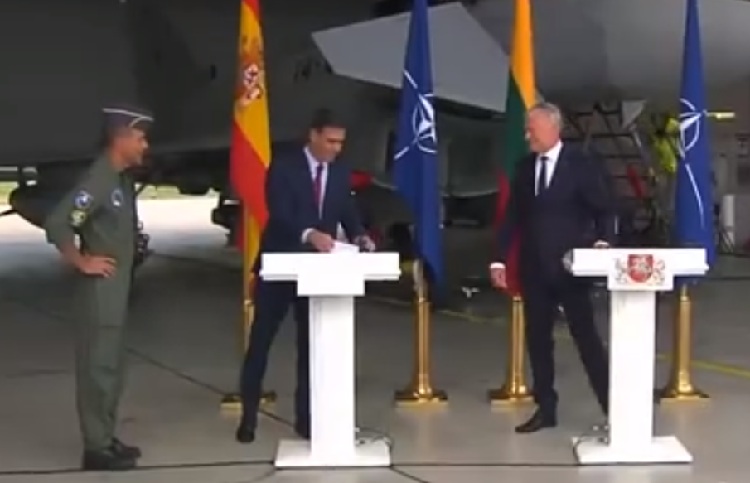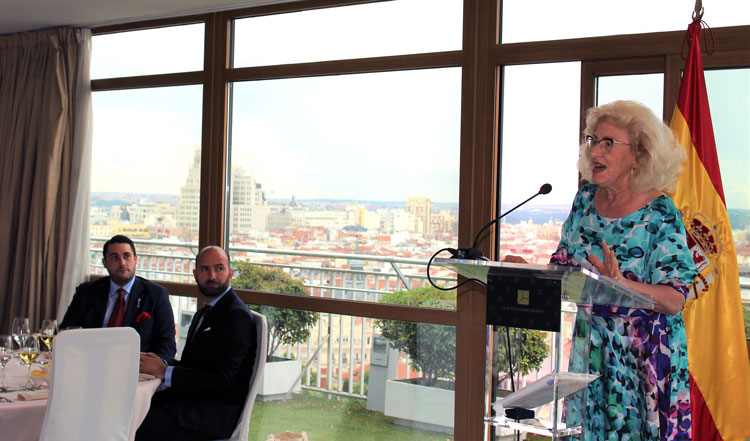Eduardo González
“Spanish society has seen with its own eyes the good work of the Spanish Armed Forces and their commitment to the territorial integrity of Lithuania and security on NATO’s eastern borders.” With these words the President of the Government, Pedro Sánchez, summed up the air incident caused by an unidentified Russian plane that forced to interrupt for half an hour an appearance before the press with the President of Lithuania, Gitanas Nauseda, at the Siauliai air base.
Barely five minutes after the start of the appearance, a group of soldiers approached the two leaders shouting “Alfa” (royal alert) to remove the lecterns and ask the two leaders to vacate the hangar where the appearance was being held, while another soldier approached a Eurofighter located just behind the two. The reason for the interruption was, according to Moncloa sources, a real alert caused by an unidentified Russian aircraft that was allegedly violating Lithuanian airspace and which was responded with the departure of two Spanish NATO fighters. The protocol obliges Eurofighters to take off instantly and to remain in flight for at least fifteen minutes to compel unidentified aircraft to leave Baltic airspace. Alliance sources have recalled that incidents of this type are common whenever there are European leaders or NATO maneuvers at the base, so, in their view, what happened yesterday was not accidental, after almost three weeks without incidents.
The hearing resumed half an hour later. “We have seen a real case that justifies the presence of Spanish troops in Lithuania”, were Sánchez’s first words after the resumption, words he repeated in his subsequent joint press conference with the Lithuanian prime minister, Ingrida Šimonytė. “I don’t know if it was a premeditated provocation on the part of Russia, we have no information and we are not going to venture”, Sanchez responded to a local journalist, but “what it has made clear is the importance of the Spanish mission and the relevance of the collaboration of the two NATO allied countries.” “Spanish society has seen with its own eyes, because these images will transcend the media, the good work of the Spanish armed forces and their commitment to the territorial integrity of Lithuania and security on NATO’s eastern borders”, he added.
Spain has deployed, until August 31, seven Eurofighter aircraft and 134 troops at the Siauliai base, within the framework of NATO’s Baltic Air Policing mission, launched in 2004 after the three Baltic countries joined the Alliance. Spain currently commands the mission, in which it has participated eight times since 2006.
Invitation to the King
During his meetings with Nauseda and Šimonytė, Pedro Sánchez addressed the migration crisis coming from Belarus (“both Spain and Lithuania are countries that have third countries as neighbors”) and condemned, in this regard, “the use by third countries of migration to put pressure on an EU member country and therefore on the EU”. “I want to express the empathy of the government of Spain with Lithuania, because we have also suffered this type of attitudes in the recent past,” he added, referring to Morocco. This problem, he warned, “if it justifies anything, it is the need for us within the EU to achieve a Pact on Migration and Asylum”.
On the other hand, Pedro Sánchez recalled that in 2022 the two countries will celebrate one hundred years of diplomatic relations and thanked the President “for the invitation he makes to the King of Spain so that he can visit Lithuania”. “In any case, given that next year Spain is holding the NATO summit in Madrid, and next year, practically for sure, Lithuania is going to be the one hosting the NATO summit, we will also be able to take advantage of those two years to strengthen in many other areas, economic and energy, but also cultural or sports, our extraordinary relations.”
During his stay in Lithuania, the last stage of his tour of the Baltic countries, Sánchez toured the center of Vilnius, met with the president of the Lithuanian Basketball Federation, Arvydas Sabonis (former player of the Soviet and Lithuanian national teams, of Real Madrid, and of the Philatelic Philatelic Forum), of the Philatelic Forum of Valladolid and the NBA) and held a meeting with the main opposition leader of Belarus, Svetlana Tikhanovskaya, who lives in Vilnius and with whom he could not meet in Madrid last December because he was forced to stay in quarantine due to a case of COVID-19. In this interview, as he himself explained at the press conference with the Prime Minister, Sánchez expressed “Spain’s commitment to democracy and freedom for the people of Belarus”.







